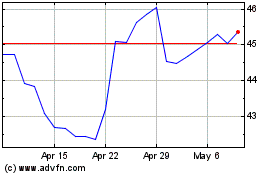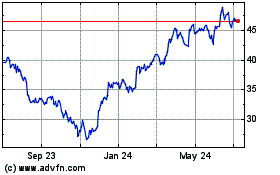By Mike Colias and Ben Foldy
This article is being republished as part of our daily
reproduction of WSJ.com articles that also appeared in the U.S.
print edition of The Wall Street Journal (May 23, 2020).
A shortage of parts from Mexico is hampering General Motors
Co.'s plans to quickly ramp up production of high-profit pickup
trucks, according to a union official and other people familiar
with the matter, underscoring the auto industry's halting restart
after a two-month shutdown from the pandemic.
GM has delayed plans to roughly double output at its two main
U.S. pickup-truck factories by adding additional shifts of workers
next week, these people said. The auto maker doesn't yet have the
flow of parts it needs to accelerate production as planned, they
said.
Companies trying to get their businesses back on track amid the
Covid-19 pandemic face a choppy landscape, including the threat of
supply-chain disruptions and worker infections or government
restrictions that can halt operations.
GM is prioritizing large pickup trucks as the auto maker
restarts North American operations, executives have said. The
company is scrambling to replenish thin dealership lots and also
needs to jumpstart cash flow, after burning through billions of
dollars over the last few months amid the industry's shutdown.
At its Fort Wayne, Ind., truck factory, GM postponed plans to
call back roughly 1,300 workers who were supposed to start Tuesday
for a second eight-hour work shift, said Rich LeTourneau, an
official at United Auto Workers Local 2209, which represents
workers at the factory. The return date tentatively has been pushed
back to June 1, he said, citing shortages of components from Mexico
as the reason for the delay.
"We continue to plan to ramp up production in a gradual
cadence," a GM spokesman said, declining to discuss specifics about
the schedule.
GM also delayed adding a second work shift at its Flint, Mich.,
pickup factory, which makes GM's largest, priciest pickup trucks,
some of the people said.
More than 1,000 additional employees had been scheduled to come
back Tuesday, but those plans have been delayed and workers haven't
been given a new callback date, the people said.
U.S. auto makers are juggling supply-chain kinks and putting in
new safety protocols as they try to restart operations following an
unprecedented eight-week shutdown to prevent the spread of the new
coronavirus.
Combined, the Flint and Fort Wayne factories accounted for about
62% of GM's output of large pickup trucks last year, data from
researcher Ward's Intelligence show.
Mexico, which is a major source of auto parts for U.S.
factories, has experienced a slower reopening of its plants, with
the country's health officials requiring manufacturers to first get
permission to resume work before the official restart date of June
1. Some factories in Mexico began reopening this week, but the
reboot of operations has been gradual.
In the U.S., GM, Ford Motor Co. and Fiat Chrysler Automobiles NV
resumed limited work at most of their factories this week, with
plans to ramp up output in coming weeks.
Two of GM's Mexican engine and transmission plants began
reopening Thursday night, and two assembly plants -- including its
third main pickup-truck plant, in Silao, Guanajuato -- began
operations Friday, a company spokesman said.
The slower start at GM's truck plants and multiple
Covid-19-related disruptions at two key Ford factories this week
are reminders of the challenges the industry faces as it tries to
crank up production.
Any disruption in pickup-truck production is especially
problematic for the Detroit auto makers, which derive much of their
profit from the hulking vehicles. It is of particular concern for
GM, whose inventory of large pickup trucks has been running leaner
than that of its competitors, partly a hangover effect from a
40-day United Auto Workers strike at its U.S. factories last
fall.
GM also had steady truck sales in April, leaving dealer stocks
further depleted.
Pickup trucks have been relatively strong sellers in an
otherwise dismal sales environment for auto makers, who in April
reported a roughly 50% drop in sales overall and continued weakness
heading into May. By comparison, pickup truck sales fell only 21%
in April and helped lift results for GM, Ford and Fiat Chrysler,
which benefited from many big truck-buying states in middle America
not getting hit as hard by the virus as on the coasts.
The relatively swift selling pace for trucks, however, has
dented inventories and dealers now worry it will take a while to
replenish stock with factories at limited output.
Ford halted work at its Explorer SUV plant in Chicago a number
of times this week after a few workers tested positive for
Covid-19. One work stoppage stemmed from a brief closure of a
nearby Lear Corp. factory after a worker there tested positive for
the virus, which cut off the supply of seats to the Ford
factory.
Ford's pickup-truck plant in Dearborn, Mich., near the company's
headquarters, closed for several hours Wednesday following a
confirmed Covid-19 case.
GM ended April with about 150,000 trucks on its dealerships'
lots, 45% less than a year earlier, according to Wards
Intelligence. Ford's inventory of F Series pickup trucks was down
15% from a year earlier. Fiat Chrysler's inventory of Ram pickup
trucks was 32% lower.
"As we begin to replenish the pipeline, trucks and full-size
SUVs will remain a very high priority," GM Chief Executive Mary
Barra said earlier this month.
The trucks, along with GM's line of mechanically similar
full-size SUVs, such as the Cadillac Escalade, generate about $65
billion in annual revenue, GM told investors in February.
Credit Suisse estimates GM's truck business racked up $10.7
billion in pretax profit in 2019, or about 90% of the company's
total, excluding the impact of the strike.
Write to Mike Colias at Mike.Colias@wsj.com and Ben Foldy at
Ben.Foldy@wsj.com
(END) Dow Jones Newswires
May 23, 2020 02:47 ET (06:47 GMT)
Copyright (c) 2020 Dow Jones & Company, Inc.
General Motors (NYSE:GM)
Historical Stock Chart
From Mar 2024 to Apr 2024

General Motors (NYSE:GM)
Historical Stock Chart
From Apr 2023 to Apr 2024
